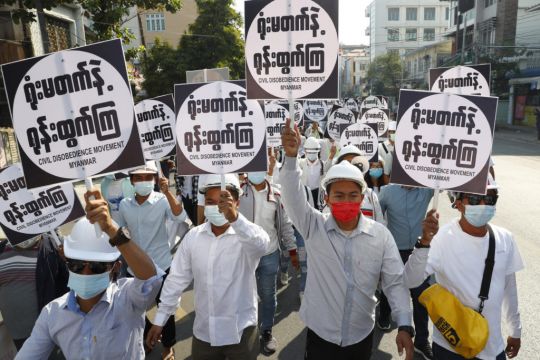Myanmar’s military leaders have extended their detention of deposed leader Aung San Suu Kyi.
The former state counsellor’s time on remand was set to expire on Monday, and her freedom is a key demand of the crowds continuing to protest against this month’s military coup.
Ms Suu Kyi will now be remanded until February 17, when she will likely appear in court by video link, according to her legal representative Khin Maung Zaw.

The Nobel laureate remains under house arrest on a minor charge of possessing unregistered imported walkie-talkies.
Ms Suu Kyi’s extended detention is likely to further inflame tensions between the military, which seized power a February 1 coup, and the protesters who have taken to the streets of cities across the south-east Asian nation seeking the return of the government they elected.
Protesters continued to gather across Myanmar on Monday after a night in which authorities cut the country’s internet access and increased security in major cities in bid to curtail demonstrations.
Thousands of engineers marched on the streets of Mandalay, the country’s second-largest city, chanting and holding signs that read: “Free our leader”, “Who stands with justice?” and “Stop arresting people illegally at midnight.”

In Yangon, the country’s most populous city, fewer protesters gathered on Monday due to the loss of the internet and reports of military vehicles on the streets.
Nevertheless, more than 1,000 anti-coup demonstrators were outside the Central Bank of Myanmar building, where there were also military trucks full of soldiers, riot police, water-cannon trucks and armoured personnel carriers.
Demonstrators carried placards that read: “#SupportCDM #SaveMyanmar.” CDM refers to the civil disobedience movement that has seen doctors, engineers and others in Myanmar refuse to work until the military releases elected political leaders and returns the country to civilian rule.

Some protesters posed for photographs in front of military vehicles while holding red signs that said “Join in CDM.”
When the military seized power, it detained Ms Suu Kyi and members of her government and prevented recently elected legislators from opening a new session of parliament.
The junta, led by Senior General Min Aung Hlaing, said it stepped in because the government failed to properly investigate allegations of fraud in last year’s election, which Ms Suu Kyi’s National League for Democracy party won in a landslide.
The state election commission refuted that contention, saying there is no evidence to support it.
The military justified its move by citing a clause in the 2008 constitution, implemented during military rule, that says in cases of national emergency, the government’s executive, legislative and judicial powers can be handed to the military commander-in-chief.







